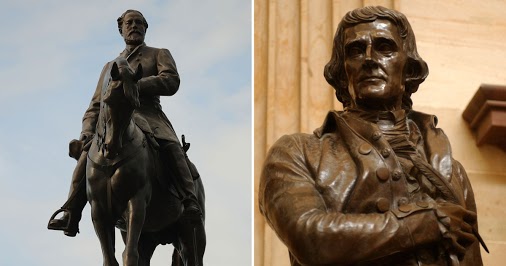So this is a good article, countering the suggestion and the logic behind it that if we take down public park statues to Robert E. Lee we will, perforce, end up taking down statues to George Washington.
And it occurs to me that, well, yeah, that might happen. And there’s nothing we can do today that will stop the future from taking down statues (or putting up statues) that we disagree with.
I mean, will the great Uprising Against Euro-Hegemony in 2067 really turn away from taking down statues to 18th Century slaveholders because in 2017 we decided against taking down statues of 19th Century slave system protectors? It seems doubtful, any more than our having erected statues on the Washington Mall only to the greatest of our Presidents will keep the 2067 Cult of Maga from demanding a statue to Donald Trump be put there.
The future is the future. It will work on its own logic and illogic. I hope that statues to George Washington don’t get taken down — but other statues have been removed when society got tired of them or felt the figures were no longer worthy of memorializing or worship — that was their decision, whether I agree with it now or not. Statues have been erected that I don’t agree with, either, and doubtless will in the future.
The only argument to be had, right here and now, is what we consider important to continue memorializing, right here and now. Having a long-term perspective is fine, and I’m willing to weight “that thing has been here for a hundred years” more than some folk are, but I can’t begin to argue that’s some sort of objective value that everyone should agree with.
To summarize:
1. As the article suggests, there is a significant difference between taking down statues to people who supported an armed rebellion against the United States in defense of chattel slavery and taking down statues to people who, incidental to their lives, practiced the custom of the time in holding slaves (or any number of other now-disdained practices).
2. While I can agree fully with No. 1, I can’t guarantee that people in twenty or fifty or a hundred years will feel the same. But those arguments will have to happen when they happen. My opinions today won’t trump the opinions of the people tomorrow who will be faced with such decisions.
3. Suggesting that no statue should ever be taken down because then any statue might be taken down is both a truism and absolutely no guide to whether to take a statue down. Ultimately it becomes a demand that the future hold precisely the same values as the present, which might sound comforting but , honestly, is not, and in either case is demonstrably highly unlikely.
No, Removing Monuments to Traitors Doesn’t Mean Removing Monuments to Founders
Confederate monuments don’t embody American history; they were built on lies about American history.

Doesn't the "demand that the future hold precisely the same values as the present", as well as the belief that the past was of a uniform constitution that we should strive to maintain, essentially define conservatism? That if we always do things the One True Way, everything will be great (again)?
+Michael Verona A good point, and clearly a blind spot of my own.
If in the future we have ethically advanced to the point where we consider their slaveholding as more critical than the other things they did. I’m fine with that. I think that will shows it as a people we will have learned to care more about how we treat others, then our other accomplishments. Can I do that to that degree myself right now? No, probably not. Like our forefathers, I am largely a creature of the time I live in.
+Kee Hinckley this issue was not without considerable debate in the time that these people were alive. No one at the time were fooling themselves that there were no abolitionist arguments. Half of the framers of the Constitution were abolitionists. There were three laws that were appeasements of slave holders. Lincoln assumed the phasing out of slavery as a position because that was the framers intention on the outset of forming the union. The average knew slavery was as wrong as say… Empires. Or Cronyism. Stop presenting them as innocent.
+Eric Walker Another piece of history that didn’t get a lot of coverage in my schoolbooks.
All I remember is Jefferson saying he was going to free them, and then reneging.
Hi